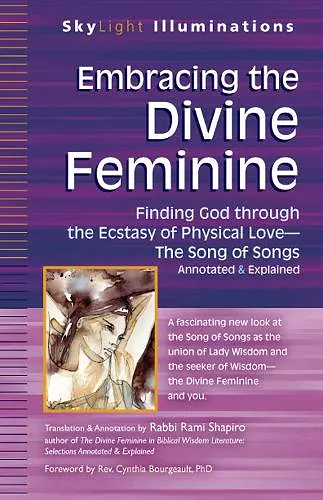Embracing the Divine Feminine
Finding God through God the Ecstasy of Physical Love—The Song of Songs Annotated & Explained
Format:Hardback
Publisher:Jewish Lights Publishing
Published:11th Dec '14
Currently unavailable, our supplier has not provided us a restock date

More than ancient erotic love poetry, this celebration of the human relationship with Wisdom can be a companion for your own spiritual journey. The Song of Songs is the Hebrew Bible's deeply erotic poem of love, sexual yearning and consummation. Holding it sacred yet troubled by its thinly veiled eroticism, Jews and Christians for millennia have read the Song of Songs as an allegory of God’s love for Israel—the classic Jewish understanding—or Jesus’s love for his Church—the classic Christian understanding. This fresh translation restores the Song’s eroticism and interprets it as a celebration of the love between the Divine Feminine and the contemporary spiritual seeker. Scholar and award-winning teacher Rami Shapiro renders this ancient love song as Lady Wisdom offering seekers physical and spiritual intimacy with her so that they might awaken to and participate wisely in the unity of God, woman, man and nature. His intriguing facing-page commentary provides historical, religious and spiritual insights from Christian and Jewish wisdom traditions as well as clear comparisons to other translations. Now you can understand the poetry, beauty, genius and mystery of the Song of Songs with no previous knowledge of the Hebrew Bible or wisdom literature. Compelling in its novelty and accessible in its presentation, this version of the Song of Songs will beckon you more deeply into Jewish-Christian sacred texts while offering you wisdom teachings and practices rooted in but not limited to religion.
Shir HaShirim, the Song of Songs by King Solomon, has been interpreted as an allegory of God's lovefor the Jewish people (and Jesus' love for the church). Rabbi Shapiro asserts that "the Song of Songsis about the realization of Wisdom through the unification of the spiritual (feminine) and the physical(masculine). The woman in the Song isn’t Israel or the church but Lady Wisdom, and the man in theSong isn’t God but you, the seeker of Wisdom." After several introductory chapters that discuss theorigins of the text (which may have been authored by someone who ascribed the Song to King Solomon),the feminine in Biblical texts, and love poems from ancient India, Shapiro provides his translation linedup next to his interpretation of the text. For example, although the Hebrew word tapuach translates to"apple," Shapiro deems “apricot” a better fit for fruit native to Israel and representative of the poet’sintent. In a chapter after the text, “The Path of Ecstasy: How to Use theSong of Songs,” the author outlinesways to unify the spiritual and the physical. Notes and a bibliography are included in the back matter. A prolific author, Rabbi Shapiro received ordination from Hebrew Union College and is also initiatedinto the Ramakrishna Order of Vedanta Hinduism. With a Foreword by Rev. Cynthia Bourgeault, anEpiscopal Priest, numerous references to the Divine Feminine in Eastern practices, and comparisonsto Christian ideas with quotes from the New Testament, the author embraces the publisher’s mottosof “Walking Together, Finding the Way” and “For People of All Faiths, All Backgrounds.” With Rabbi Shapiro’s bold disagreement with Rashi’s allegorical interpretation and suggestions for “a fullerecstasy” practice with a partner, this book is not for traditional Jews. It will have a place in librariesthat collect feminist-oriented literature and novel interpretations of Judaic texts, and whose patrons areinterested in comparative religion and creating their own rituals. -- Chava Pinchuck * Association of Jewish Libraries *
ISBN: 9781683360452
Dimensions: unknown
Weight: unknown
176 pages